The Faculty of Philosophy of the Jagiellonian University offers Erasmus+ students a wide range of courses, taught in English. Erasmus+ students have at their disposal dedicated courses, offered by the Faculty units: Institute of Philosophy, Institute of Education, Institute of Psychology, Institute of Religious Studies, Institute of Sociology and Department of Comparative Studies of Civilisations.
1. Kurs: Facing the Changing World. Interdisciplinary Perspective: methodological issues
- Forma: wykład online
- Ilość godzin: 36
- ECTS: 5
- Zaliczenie: Test z pytaniami otwartymi (na podstawie lektur i treści wykładów)
- Proponowana wycena ECTS:
- 1 ECTS – 25-30 godzin pracy studenta
- 36 h wykłady – 1,5 ECTS
- 34 h lektura tekstów – 1,5 ECTS
- 58 h przygotowanie do testu + 2 h egzamin testowy – 2 ECTS
- Razem:
- 130 h – 6 ECTS
2. Zestaw kursów specjalistycznych do indywidualnego wyboru z proponowanej puli kursów z obszaru: filozofii, pedagogiki, psychologii, socjologii, nauk o kulturze i religii, których tematyka i stosowane podejścia badawcze pozostają w związku z problematyką poruszaną w wykładzie wprowadzającym (lista aktualnych kursów wraz z wyceną punktów na semestr zimowy i letni w konkretnym roku akademickim jest dostępna na stronach jednostek Wydziału Filozoficznego).
Zaliczenie całości modułu:
- zaliczenie wykładu: Facing the Changing World. Interdisciplinary Perspective: methodological issues (test z pytaniami otwartymi),
- zaliczenie wybranych kursów specjalistycznych z puli kursów oferowanych przez jednostki WFz w module 2 (sposoby zaliczenia wskazane w sylabusach kursów),
- ilość przyznanych punktów ECTS jest sumą punktów zgromadzonych za uczestnictwo w wykładzie teoretycznym oraz w wybranych kursach z list podanych przez jednostki Wydziału Filozoficznego.
Świat się zmienia na naszych oczach: wojny, terroryzm, odradzanie się skrajnych nacjonalizmów i anty-demokracji, rewolucje obyczajowe… Zmieniający się świat to też nowe technologie, cyfryzacja i rozwój nowych mediów komunikacyjnych. Gdzie jest miejsce Człowieka wobec tych wszystkich zmian? Jakie są zagrożenia? Jakie korzyści niosą zmiany? Wydział Filozoficzny Uniwersytetu Jagiellońskiego zaprasza studentów programu Erasmus+ do wspólnego namysłu nad zmieniającym się światem i konsekwencjami tych zmian dla jednostek i grup społecznych.
The aim of the course is to familiarize students with the basic methodological problems that science confronts when trying to study the reality of the rapidly changing modern world. New civilization phenomena, including new technologies, digitalization and the development of new communication media, are changing societies and cultures, creating new research problems and requiring adequate methodological tools to study them. Specialists from five scientific disciplines, such as: philosophy, psychology, sociology, cultural and religious studies, and pedagogy will introduce course participants to the issues of methodology in the field of humanities and social sciences. Starting with basic questions in the field of philosophy of science and gradually moving on to presenting the research and methodological specificity of five disciplines, additionally introducing an interdisciplinary perspective, the lecturers will show selected examples of the usefulness of classic and new methodological tools in contemporary scientific research.
The lectures are organised in six 6-hour units:
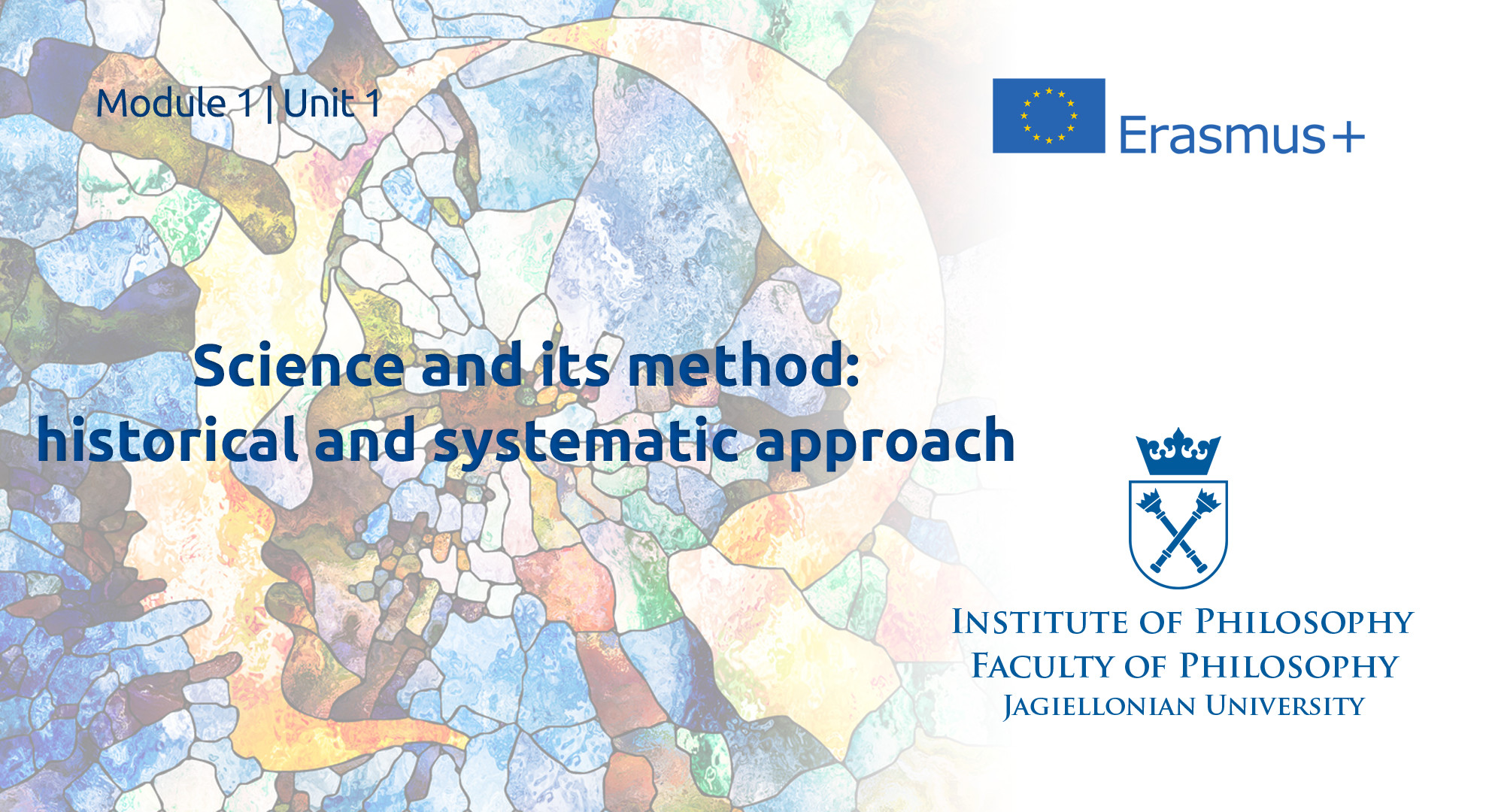
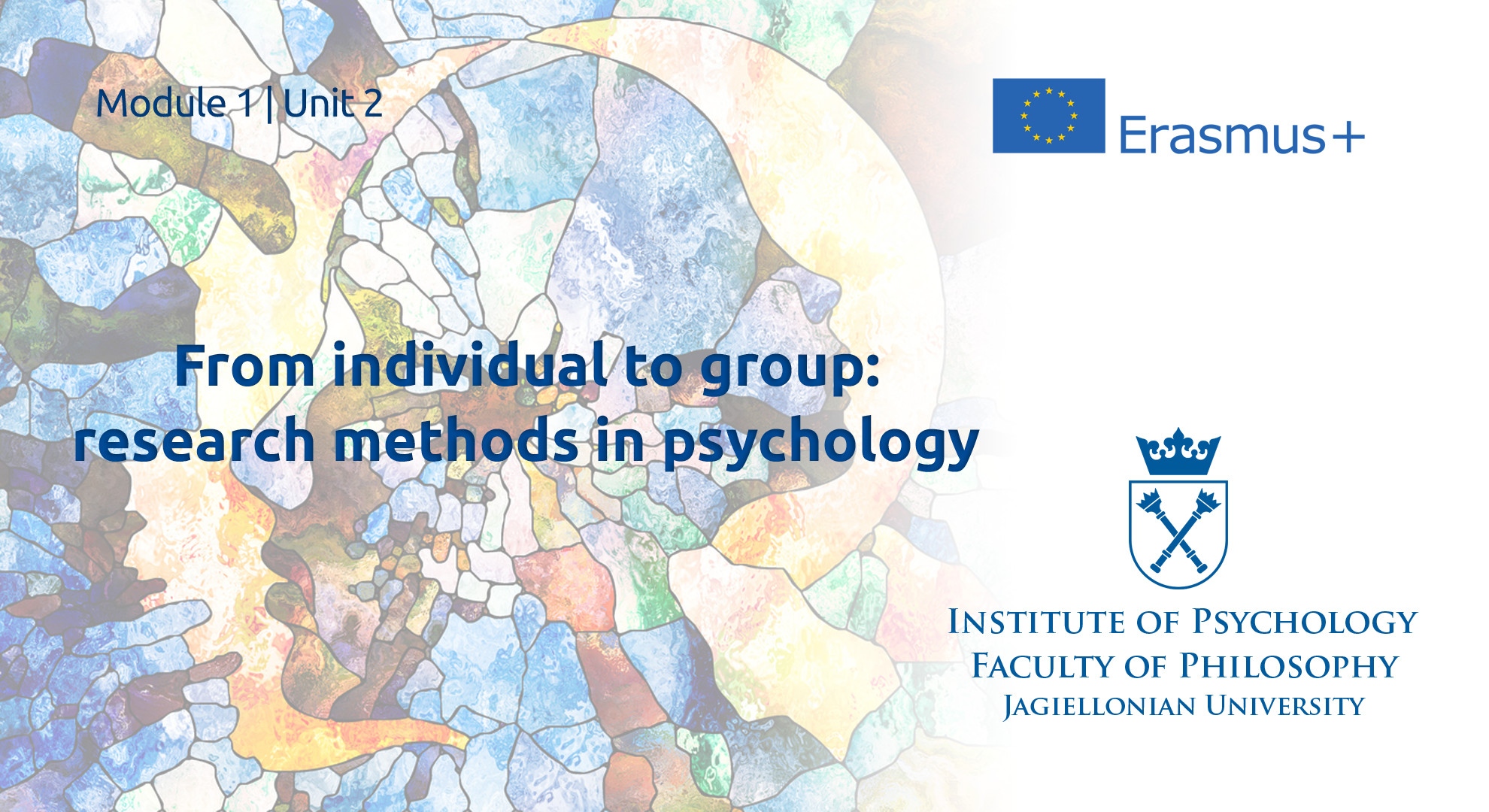
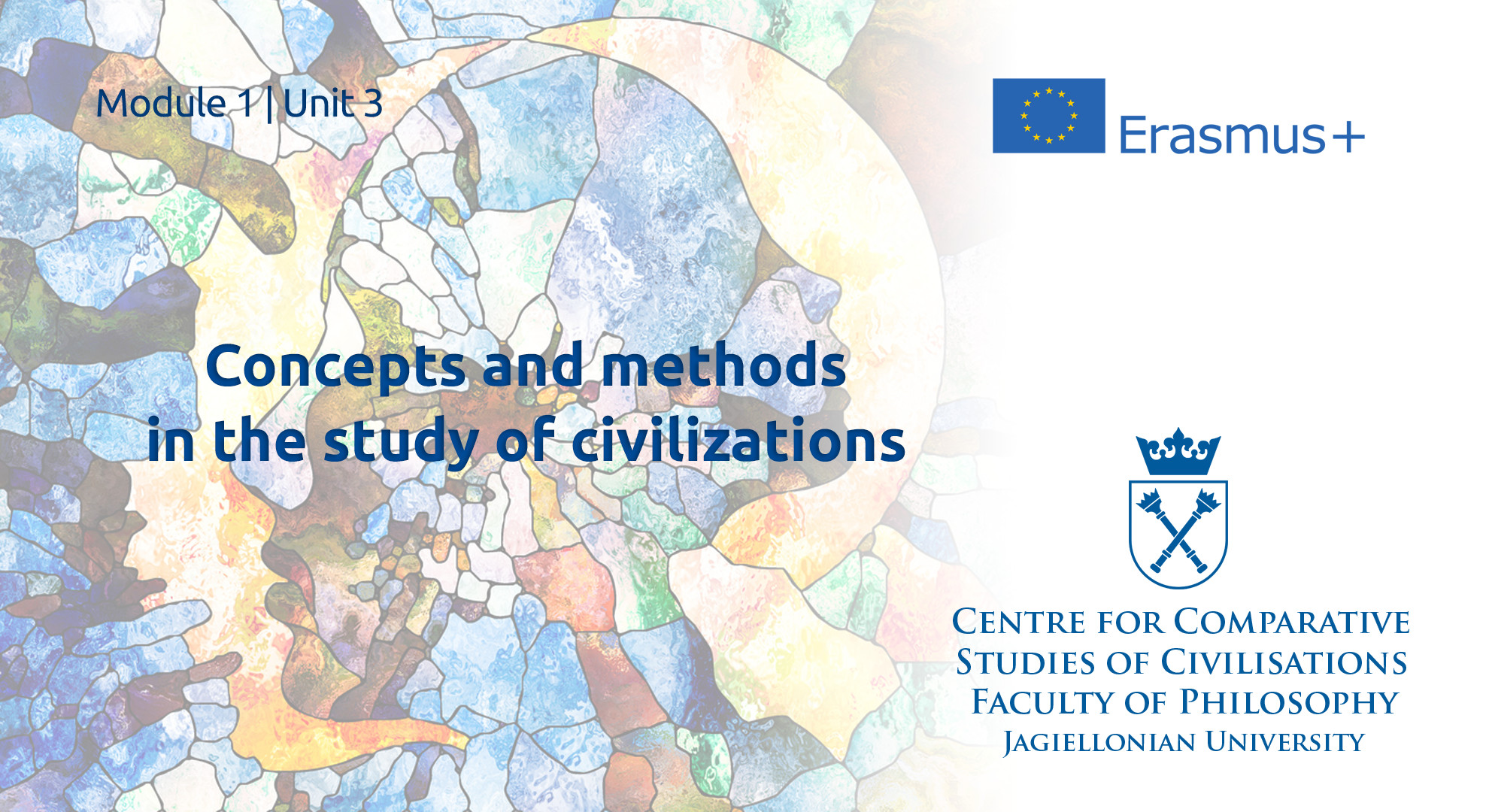
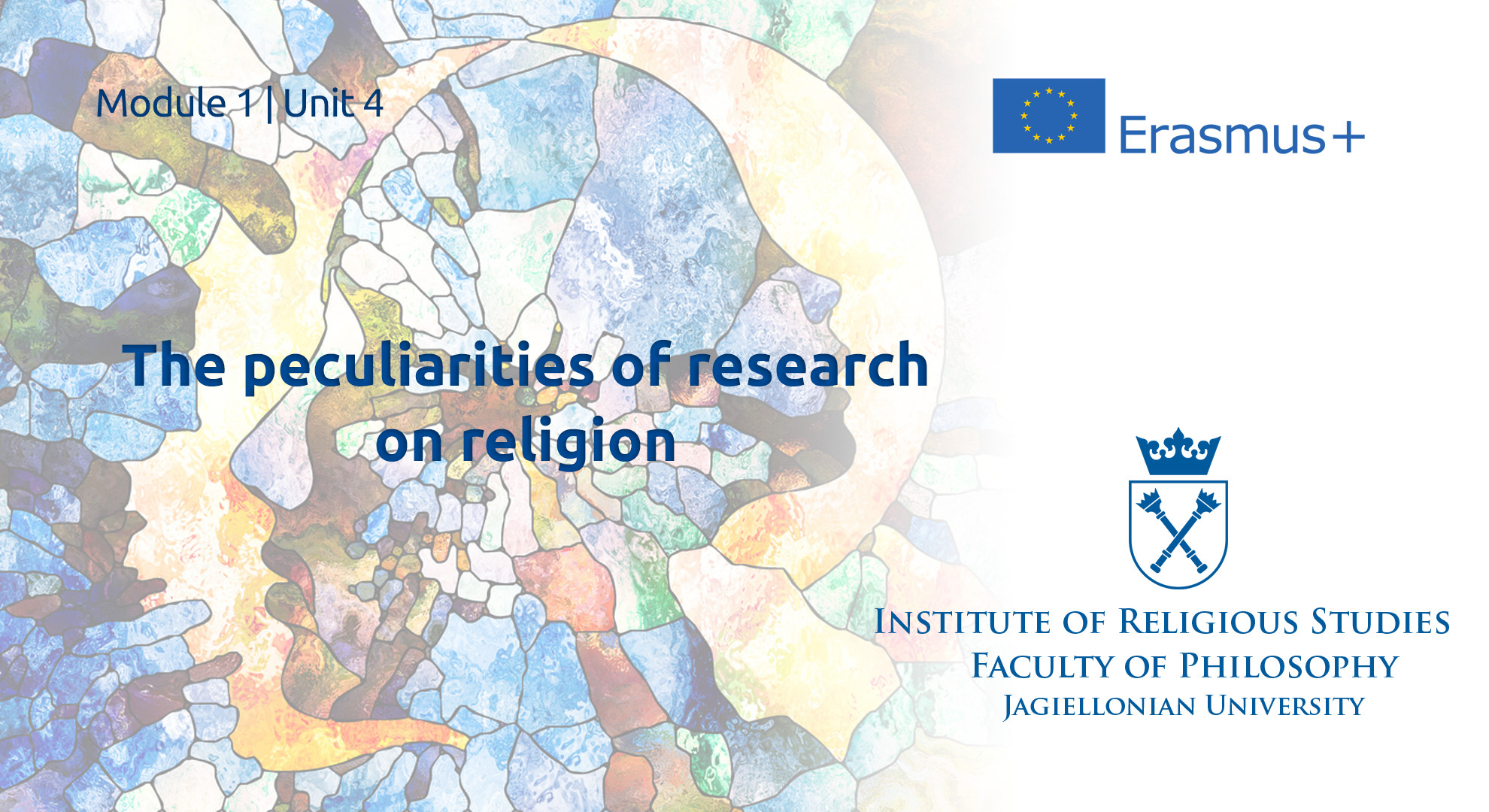
Mode of assessment: a couple (5?) of test questions based on the lectures and self-studying a chapter in: G. Flood, The importance of religion; Meaning and action in our strange world, Wiley-Blackwell 2012, p. 53-79 (chapter: The meaning of religious action)
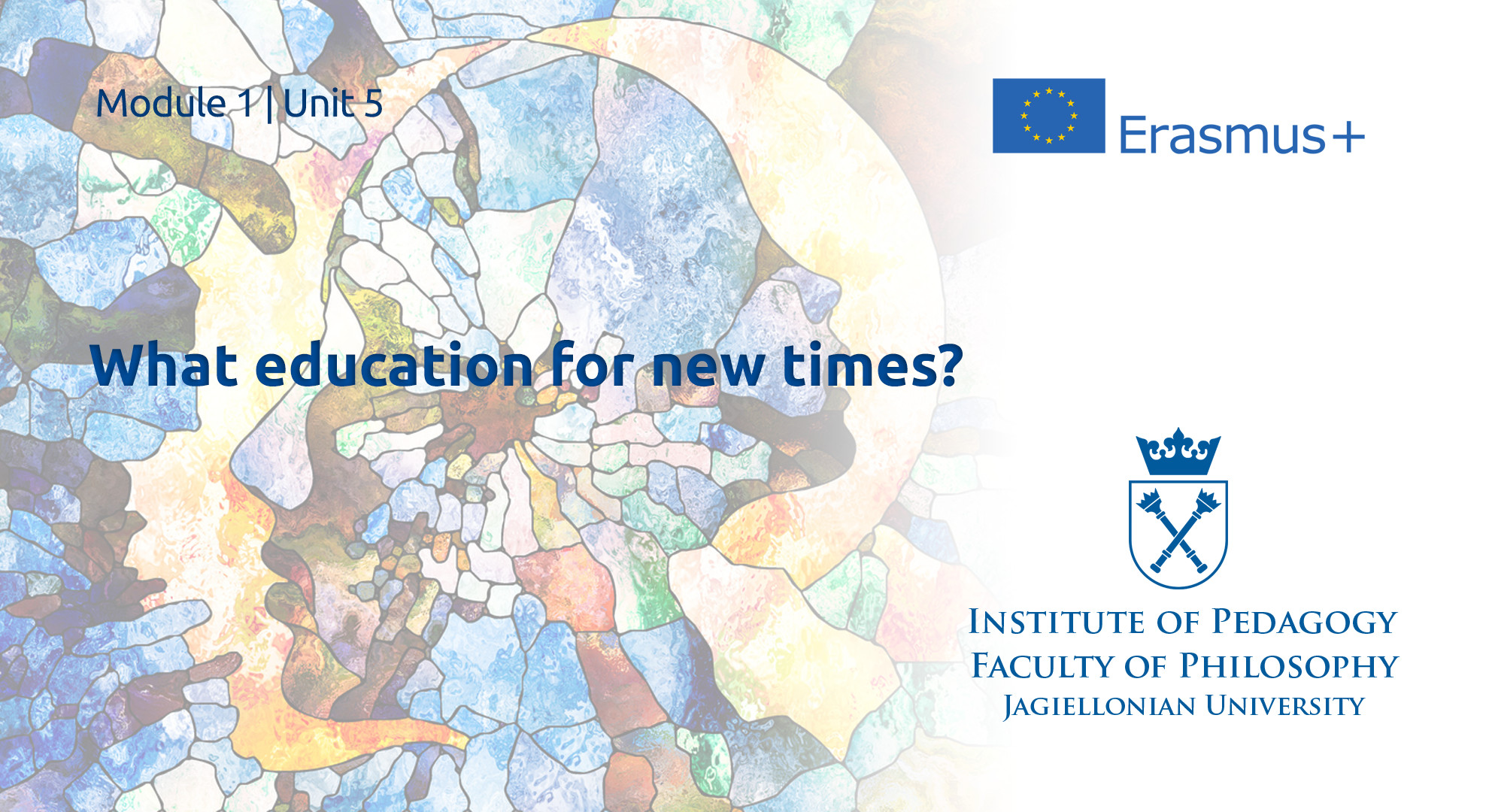
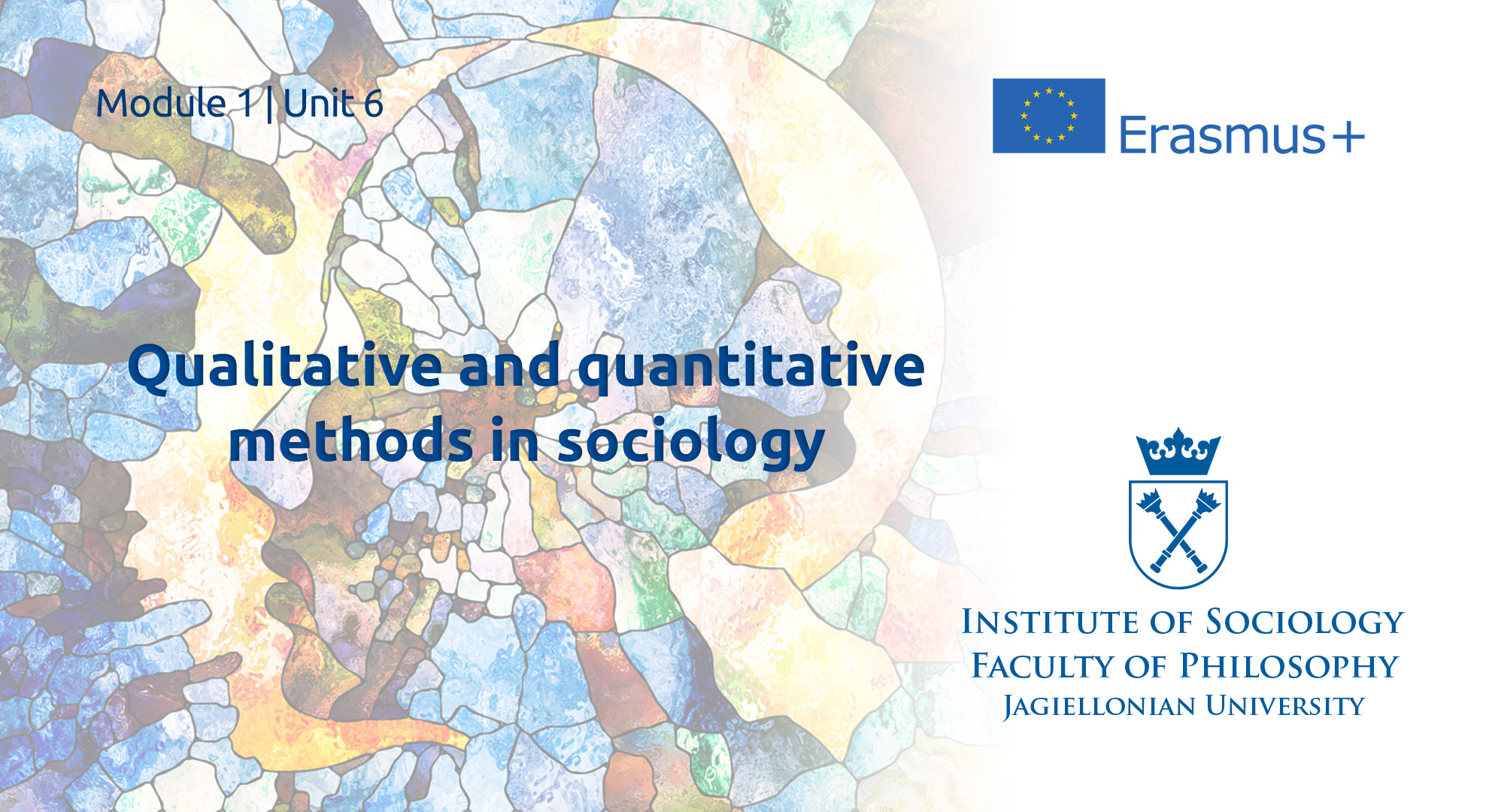
Kryteria oceny kursu:
Warunkiem przejścia do kolejnego UNITU jest zaliczenie testu dopuszczającego (testu wyboru).
Unit 1: Science and its method: historical and sytematic approach (Instytut Filozofii)
Lecture 1: Classical approaches
Lecturer: dr hab. Steffen Huber, prof. UJ
Historically, the beginning of philosophy marks the beginning of scientific methods. Once abstract concepts such as "principle" or the various forms of "being" replaced Kronos and Zeus, the thinking required formal procedures called methods. Hypotheses, theses, antitheses and syntheses, induction and deduction, syllogisms and aporetic challenges, maieutical provocation and dialogue strategies ensured the correctness of scientific work. In the first lesson, we will look at the achievements of classical Greek philosophy, particularly of Presocratics, Plato and Aristotle.
Lecture 2: Early Modern approaches
Lecturer: dr hab. Steffen Huber, prof. UJ
The Aristotelian methodology, embodied by the "Organon" ("toolbox"), had focused on the language-world problem. Moreover, it remained connected to cosmological ideas proved wrong in the Renaissance. Francis Bacon's "Novum Organum" (1620) delivers a theory of experimental science. Instead of interpreting nature by a set of formally pre-defined causes, Bacon taught how to locally "disturb" the order of things and subsequently discover the hidden "powers" of nature. René Descartes introduced a shockingly bold approach to doubt. Instead of resolving or reducing it, scientists were to radicalise it. Once all objective certainties vanish, the knowing subject discovers its necessary existence as the new paradigm of scientific evidence.
Lecture 3: The autonomy of the humanities
Lecturer: dr hab. Steffen Huber, prof. UJ
In early Modernity, the accuracy of natural sciences had an essential impact on the humanist philosophy, and the so-called geometrical method inspired works like Spinoza's Ethics and Pufendorf's theory of law. However, there remained a need for alternatives that would take care of some specific needs of the humanities. Following ancient paragons, Niccolò Machiavelli delivered a method for the study of politics through the psychological patterns hidden in history (Discorsi, 1517). Giambattista Vico's "New Science" (Scienza Nuova, 1725) appreciated the human factor from a more theoretical perspective: things are not true insofar as they are what and as they are, but as they are made by human beings. And in the 20th century, Husserl's phenomenology opened a vast field of scientifically accurate knowledge which remains sensitive to the problems of human life like the world that we create by living in (Lebenswelt), body experience or interpersonal relations.
Lecture 4: Metaphysics in science
Lecturer: dr Jacek Wawer
In this part of the course, we try to determine what kind of worldview is presupposed by scientific practise and scientific theories. We consider two options: minimalism and realism. According to minimalism, our world consists uniquely of objects and their properties (in more extreme version, it consists of particular data of the senses only); all other scientific entities are some form of constructs from objects and their properties. According to realism, on the other hand, something more is required to fully capture the scientific worldview: we need to postulate the 'hidden realm' of entities that are not directly accessible, but are required to rationalise the behaviour of the objects around us.
We will use examples of laws of nature and theoretical entities to better understand the debate. We shall study the relation between a law of nature and the objects governed by this law, and the relation between 'ordinary' objects (like stones, trees, and human bodies) and 'theoretical' objects (like electrons, fields, mental states, or social groups). The minimalists and the realists offer very different accounts of laws and theoretical entities, and we shall study costs and benefits of both accounts. Also, we will consider whether there is a substantial difference between quarks and black holes, on the one hand, and spiritual beings and UFOs, on the other.
Lecture 5: Scientific explanation
Lecturer: dr Jacek Wawer
Our starting point will be the so-called nomological-deductive (and statistical-inductive) model of explanation according to which to explain is to show that a given phenomenon subsumes under a general rule. The problems of this model will lead to a more holistic approach in which a given explanation is assessed against the background of alternatives. We shall study properties of good explanations which will naturally lead us to the idea of Inference to the Best Explanation (IBE, also called 'abduction'). We shall consider whether IBE supports the realistic view of science (see Part 1). Also, we will study some popular nonscientific explanations (e.g., astrological explanations) and see how they fare against the background of IBE. The study of IBE will help us understand why some unorthodox theories (e.g. those spread among the antivaccine advocates, climate change sceptics, or flat-earthers) may well look rational and well justified against the background of appropriate background beliefs and theories. Thus, the persistence of such theories has not only psychological or sociological explanations, but also a philosophical one.
Lecture 6: Epistemology in Science
Lecturer: dr Jacek Wawer
In this part, we will consider the relation between a theory and a piece of observation that is supposed to confirm it. We will look at two aspects of this relation. Firstly, we ask if it is even possible to draw a sharp line between theory and observation. To what extent are observations theory-driven and theories observation-infused? This will reveal natural 'self- preservation' mechanisms that are built into every theory and bring us back to reflexion on unscientific theories (e.g., conspiracy theories), and help us understand how they manage to flourish, even in the presence of apparent counter-evidence. Secondly, we will look at the inductive scepticism according to which the very idea that theories can be confirmed by empirical evidence is ill-informed. This will lead to the question of whether science is a rational project at all and whether it is possible to do science without induction.
Lecture 7 and 8: The essentials of quantitative methods in psychology
Lecturer: dr Piotr Dragon
We will embark on a journey from the initial development of a research idea to the steps leading towards publication. Key concepts such as variables and the principle of randomization will be succinctly introduced to provide a foundational understanding. The course will offer a snapshot into the world of experimental research, presenting a basic overview. We will provide a brief glimpse into quantitative data analysis, highlighting its significance in psychology research. This includes a quick look at how data is collected, analyzed, and interpreted. We will also ensure to underline the ethical considerations essential in psychological research. By the end of this session, you'll gain a fundamental insight into quantitative methods, setting the stage for further exploration in the field.
Supplementary literature: Jhangiani, R. S., Chiang, I.-C. A., Cuttler, C., & Leighton, D. C. (2019). Research Methods in Psychology. Kwantlen Polytechnic University. (an open-source book, can be accessed here: https://kpu.pressbooks.pub/psychmethods4e/)
Lecture 9 and 10: Qualitative research in psychology: epistemology, experience, values.
Lecturer: dr Weronika Kałwak
The qualitative approach will be discussed with its inductive, descriptive, exploratory, and interpretive nature, as well as its focus on individual and their subjectivity. A variant of the general research procedure specific to qualitative methodologies and various examples of qualitative data analysis will be presented. The lecture exposes a special role of qualitative research in understanding important social and public health issues. Examples will demonstrate the connection between qualitative research and psychological and social practice.
Obligatory literature: Malterud, K. (2001). Qualitative research: standards, challenges, and guidelines. The lancet, 358(9280), 483-488.
Supplementary literature: Willig, C. (2013). Introducing qualitative research in psychology. McGraw-Hill education (UK).
The qualitative approach will discuss the descriptive, exploratory, focused on the individual and his/her subjectivity nature of qualitative research and its justification. A variant of the general research procedure specific to qualitative methodologies and various examples of qualitative data analysis will be presented. Examples will demonstrate the connection between qualitative research and psychological and social practice.
Lecture 11 and 12: Psychophysiological methods in Psychology
Lecturer: mgr Marcin Koculak
As part of the psychophysiological approach, the most common physiological (cardiac activity, respiration, GSR) and neuronal (EEG, MEG, NIRS, fMRI) measures used in psychological research will be presented. Methods of inferring the functioning of the psyche based on the above-mentioned measures will also be discussed (correlations of behavioral and neural activity, direct stimulations, or lesions) along with an indication of their advantages, disadvantages, and mutual complementarity.
Lecture 13 i 14: The Many Cultures of Theatre, Music and Dance: concepts, communities, and practices
Lecturer: dr hab. C. Galewicz, prof. UJ
This lecture proposes a short introduction to the cultural research on performing arts in general and the universe of multiple performing genres of South Asia in particular. It remains focused on socio-cultural background of contemporary forms of traditional genres of theatre, classical, folk and temple music, as well as ritualized spectacles of possession dance. It blends ethnography with historical sources while looking at the dynamics of power relations, politics of revival, division of labour and potential for social subversion. The cultural approach includes attention to communities of performers and audiences, materialities of performance, as well as social and cultural bodies of actors and musicians. It embraces a perspective on the clash between traditional ideology of performance and changing social practices combined with new claims for control over cultural heritage and rapid commodification.
Mandatory reading: T. Vishvanathan, Mathew H. Allen, Music in South India: Experiencing Music. Expressing Culture, Oxford Univ Press 2004 (selections), David Shulman, The Rite of Seeing: Essays on Kūṭiyāṭṭam, Primus Book 2021 (selections), Stuart Blackburn, Singing of Birth and Death. texts in Performance, Univ of Pensylvania 1988 (Selections). Rich Freeman, Untouchable Bodies of Knowledge in the Spirit Possession of Malabar, in H. Micjaels, ed. Images of the Body in India, Routledge 2011.
Lecture 15 i 16: Civilisations, Empires and Media Communication: the Toronto School and its followers
Lecturer: dr hab. C. Galewicz, prof. UJ
This short introduction to the civilizational approach to history of media and communication is a brief overview of key concepts, selected research methods and analytical tools that animated media communication studies in a civilizational perspective: empires and civilisations, the bias of communication, light and heavy media, cool and hot media, elemental and infrastructural media. It focuses on historical and contemporary patterns and modalities of cultural transmission that used to frame the development and transformation of civilizations over time and space. It addresses specifically an in-depth current in contemporary media communication theory and practice inspired by the new appropriation of the legacy of the Toronto school of communication (Innis, McLuhan, Ong, Peters). Topics include: Light and heavy media; Bias of communication; New time sensibility and media world of M. McLuhan; Fame and the print engine of immortality; Punctuality: the 19th c. bourgeoisie and their pedantic devotion to mechanical-time and sequential order; The ever awaken city: an aggregation of somnambulists and zombies; Leverage and infrastructuralism; The sky, ocean and earth media.
Mandatory reading: Harold A. Innis, Empires and Communication, Victoria 1986 (selections), Marshall McLuhan, Understanding Media. Extentions of Man, Chicago 1995 (selections), John Durham Peters, Marvellous Clouds. Toward Philosophy of Elemental Media, Chicago 2015 (selections)
Lecture 17 i 18: History and Archeology of Media in Studies of Civilisations: ideas, schools and travelling concepts
Lecturer: dr hab. C. Galewicz, prof. UJ
This is a brief introduction to research ideas in History and Archaeology of Media for the study of civilisation(s). It embraces key concepts and selected research methods that animated media communication studies in a civilizational perspective. It focuses on historical and contemporary patterns and modalities of cultural transmission that used to frame the development and transformation of civilizations over time and space. It addresses specifically an in-depth current in contemporary media communication theory and practice inspired by the new appropriation of the legacy of German cultural studies (Kittler, Siegert, Peters). The course aims at informing as well as inspiring future research in cultural studies with a focus on media communication and history of civilisations. Presuppositions include: modalities of media behaviour are culturally biased, we need a new focus on the materialities of communication. The metaphor of media cultures is taken as an operative concept for understanding broader cultural formations evolving around specific media practices reproduced in specific regions, historical periods and communities. Topics include: Kulturtechniken-cultural techniques and technologies; the world of the symbolic and the world of machines; Flat and striated spaces; Media as "civilizational ordering devices"; God, Google and media theology; Media of nature and denying human monopoly of meaning.
Mandatory reading: Friedrich Kittler, Gramophone, Film, Typwriter, Stanford 1999 (sellections), Bernhard Siegert, Cultural Techniques. Grids, Filters, Doors, and Other Articulations of the Real, New York 2015 (selections), John Durham Peters, Marvellous Clouds. Toward Philosophy of Elemental Media, Chicago 2015 (selections)
Unit 4: The peculiarities of research on religion (Iinstytut Religioznawstwa)
Lecture 19 and 20: Religious studies as a peculiar discipline
Lecturer: prof. dr hab. Andrzej Szyjewski
Religious studies as a peculiar discipline, due to its concentration on the subject rather than on a methodology separate from other humanities and social sciences. Peculiarities of the object of study: the omnipresence of religion in the history and contemporary cultural diversity of mankind. The relevance of religion in the modern world on examples. Consequences: religion studied multidisciplinarily (history of religion, sociology of religion, psychology of religion, anthropology of religion, phenomenology of religion, philosophy of religion, cognitive science of religion). Importance of comparative methodology for religious studies. As a result, the phenomenon of religion is studied in religious studies as multidimensionally as possible (‘triangulation’).
Lecture 21 and 22: Research on religion within the humanities
Lecturer: prof. dr hab. Andrzej Szyjewski
Research on religion within the humanities at the Institute for Religious Studies, Jagiellonian University (examples):
- Examination of Kabbalistic mystical traditions of Judaism: Adoption of hermeneutics extended to the context of evolution and human specificity as a possibility of researching universal interpretative patterns.
- Historical research: Objects in ritual. Interpretation of religious nomenclature and practices in ancient Greece. To explore the relationship between material culture and ritual by adopting an emic view of source materials. The adopted methodology allows, to the extent available to us, to look at these "objects" through the eyes of the people for whom they were originally intended. - Philosophical research: The relationship of faith and reason considered from the side of changing ways of understanding what human reason is. Adopting this perspective makes it possible to rethink the relationship between faith and reason, and to discover that their history is at the same time a history of the gradual separation of reason from the divine
Lecture 23 and 24: Researching religion from the social sciences
Lecturer: prof. dr hab. Andrzej Szyjewski
Researching religion from the Social Sciences in the Institute for Religious Studies (examples)
- Psychological research: The perception of God and the tendency to take risks. The search for a universal motivation for the need for faith by examining the tendency to undertake risky actions depending on the way of perceiving sacred forces and determining the mechanisms responsible for the occurrence of such dependencies.
- Sociological research: Poland remains one of the most religious countries in Europe. In this context it is particularly important to pay attention to the relationship between religion, mothering and identity of young mothers, since religion often affects the way mothers understand their role.
- Anthropological research: the study of the mythical sources of the collective identity of Australian Aborigines, considered as an important link between the cultural model of the world and man, and the motivations and actions of the bearers of this model.
Lecture 25: History of the Institute of Education at the Jagiellonia n University and general research areas of the Institute departments. The distinction between pedagogy and education - theoretical and practical implications
Lecturer: dr hab. Marek Kościelniak, dr Zuzanna Sury
Lecture 26: Educational research as a response to changing world challenges
Lecturer: dr hab. Marek Kościelniak, dr Zuzanna Sury
1.1. Reasons for conducting pedagogical and educational research
1.2. General types of research methodologies in the Institute of Education at the Jagiellonian University
1.2.1. Philosophical methods in pedagogy
1.2.2. Quantitative, qualitative and combined designs
2. PISA; TIMSS; PIRLS as international research studies responding to the challenges of today's world. Other examples of educational research: studies on the impact of education conducted during pandemic on school achievement and student behaviour; studies on the scale, forms and causes of aggressive behavior of students in schools; studies of the well-being of Ukrainian students in Polish schools.
Lecture 27: Quantitative design in empirical educational research
Lecturer: dr hab. Marek Kościelniak, dr Zuzanna Sury
1.1. Advantages and disadvantages of this research approach
1.2. Examples of research projects led by academics from the Institute of Education.
Lecture 28: Qualitative design in empirical educational research
Lecturer: dr hab. Marek Kościelniak, dr Zuzanna Sury
1.1. Advantages and disadvantages of this research approach
1.2. Examples of research projects led by academics from the Institute of Education.
Lecture 29: Specificity of combined designs of research on education (mixed methods, action research, evaluation research)
Lecturer: dr hab. Marek Kościelniak, dr Zuzanna Sury
1.1. Advantages and disadvantages of this research approach
1.2. Examples of research projects led by academics from the Institute of Education.
Lecture 30: Specificity of philosophical methods in pedagogy
Lecturer: dr hab. Marek Kościelniak, dr Zuzanna Sury
1.1. What is the use of philosophical methods in pedagogy and education?
1.2. Examples of research projects led by academics from the Institute of Education
Lecture 31 and 32: Quantitative survey research: how investigating 2000 people can tell us what’s happening with 20 million people (or 8 billion if you will)?
Lecturer: dr Szymon Czarnik
This will be a brief introduction into methodology of quantitative survey research – how we design questionnaires, select samples, get responses, and get around to doing data analysis.
Lecture 33 and 34: Analyzing male-female differences in the labour market
Lecturer: dr Szymon Czarnik
We'll have a look into the data collected in the Poland's Human Capital Study, and use them to investigate economic activity, occupational segregation and differences in pay between men and women.
Lecture 35 and 36: HIVstories: oral history interviews in researching and archiving HIV policy worlds in Europe
Lecturer: dr Agata Dziuban
This module will ask about the different possibilities of doing social research in the field of policy-making. We will explore the oral history interviews – a method allowing us to grasp the unfolding of historical events and processes from the first-hand individual and personal perspectives of those whose voices are often invisibilised and excluded from dominant narratives and archiving strategies. Drawing on the European HIV/AIDS Archive developed in the framework of the “Disentangling European HIV/AIDS Policies: Activism, Citizenship and Health” research project, we will look into how oral history-based study can enable us to explore the complex and dynamic policy worlds in the European field of HIV/AIDS.

